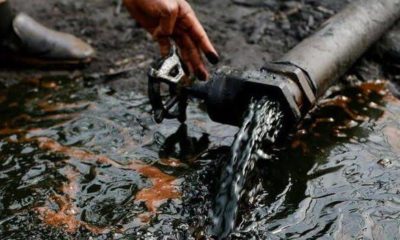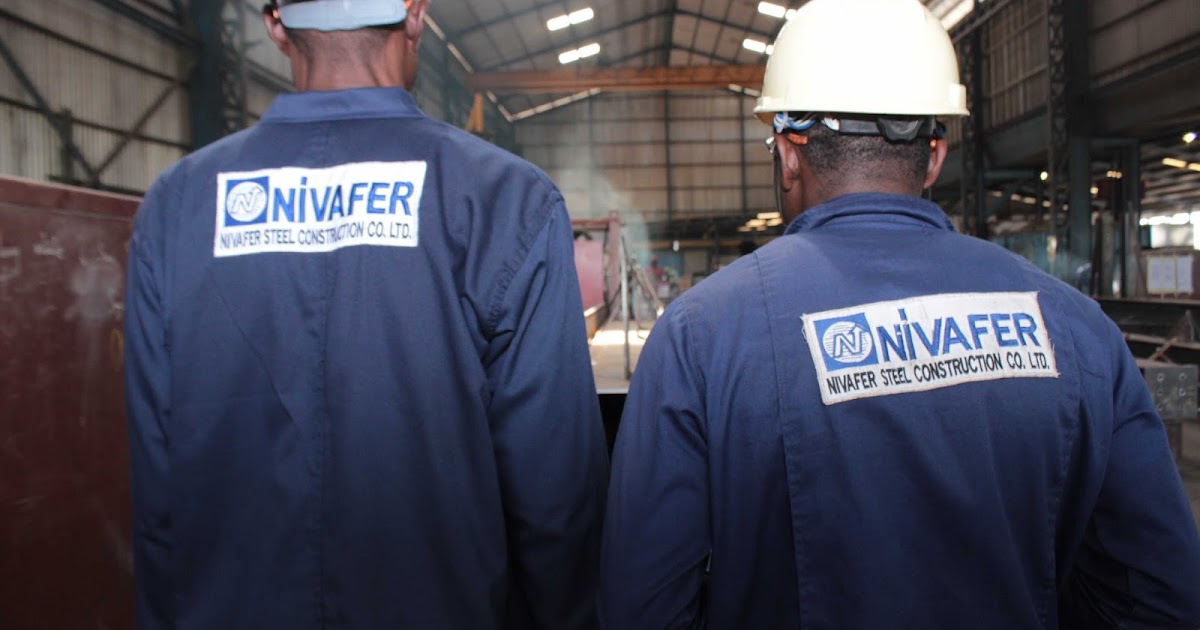Oil
Ogoni clean-up: Shell denies any wrongdoing, insist on following UNEP recomendations

By Yemie ADEOYE
LAGOS-FOLLOWING speculations making the rounds with regards to Amnesty international’s decision to release a new report indicting Shell over the Ogoni clean up, the Anglo-Ducth Oil giant has denied any wrongdoing in the clean-up process and insisted that no clean up is possible while illegal bunkering and pipeline vandalism remains a regular practice in the area.
According to shell “you can not mop or clean the floor while the tap is running, as all attempts in that regard would remain futile”.
 The Company stated further that the UNEP report was very clear in its recommendations to bring about a sustainable clean-up exercise in Ogoni land. The report stated that the federal government should take the lead in a multi-dimensional clean-up approach involving all stakeholders including Shell, but Shell is expressing worry over Amnesty internationals decision to single it out for the clean-up when the UNEP report was very clear on its recommendations.
The Company stated further that the UNEP report was very clear in its recommendations to bring about a sustainable clean-up exercise in Ogoni land. The report stated that the federal government should take the lead in a multi-dimensional clean-up approach involving all stakeholders including Shell, but Shell is expressing worry over Amnesty internationals decision to single it out for the clean-up when the UNEP report was very clear on its recommendations.
Speaking on the development“A spokesman of SPDC, Precious Okolobo said: Without having access to the report it is difficult to respond to these issues in a thorough manner.
“Implementation of the UNEP report is part of a wider programme of remediation, pipeline protection, community engagement and social investment activities being undertaken by the SPDC JV with its government, community and civil society partners in Ogoniland.
These include grassroots campaigning on the health and environmental impacts of crude oil theft and illegal refining in all four local government areas of Ogoniland; implementation of alternative livelihoods programmes, including an agricultural entrepreneurialism scheme focused on Ogoni youth; and technical support to the Eleme water project, which is now administered by the Rivers State Government.
“SPDC JV is committed to cleaning up all spills from its facilities, irrespective of cause. This is equally the case in Ogoniland, despite the fact that we ceased producing oil and gas there in 1993. As the UNEP report stated, it is crucial to put an end to the widespread theft and illegal refining of crude oil, which continue to cause new spills and impact on the environment. Ensuring long-term sustainability remains a challenge that will require coordinated and collaborative action from all stakeholders.”
Oil
NNPC Targets 60% Methane Emission Reduction By 2031
The Nigerian National Petroleum Company Limited (NNPC) has unveiled a bold strategy to reduce methane emissions in the oil and gas sector by 60% by 2031, with an ultimate goal of achieving net-zero emissions by 2060.
This announcement reinforces Nigeria’s leadership role under the Global Methane Pledge initiative and its commitment to tackling climate change.
The Group Chief Executive Officer of NNPC, Mele Kyari, disclosed these plans during a meeting on Thursday with Robert Leahman, the U.S. State Department’s Global Methane Program Manager, and a delegation from Deloitte.
READ MORE: Atiku Gloats Over AUN’s Achievements Ahead Of 20th Anniversary
The discussions, held at the NNPC Towers in Abuja, focused on collaborative efforts to reduce methane emissions through innovative and sustainable practices.
“Reducing methane emissions is not just an environmental necessity but also a strategic imperative for Nigeria’s energy transition. We are leveraging partnerships to adopt global best practices and innovative solutions,” Kyari stated.
Key among these efforts is a pilot project in the Niger Delta, aimed at establishing emissions baselines, mitigating methane leaks, and promoting sustainable operations across Nigeria’s energy sector.
The project, a partnership between NNPC, Deloitte, and the U.S. Bureau of Energy Resources, will utilize data-driven methodologies to pinpoint and address methane hotspots.
Robert Leahman commended Nigeria’s proactive stance, describing it as a benchmark for other nations on the continent.
“Nigeria’s leadership under the Global Methane Pledge sets a standard for the continent. These initiatives will not only help reduce emissions but also drive sustainable development in the energy sector,” he said.
Kyari highlighted the broader benefits of addressing methane emissions, noting its significance for both environmental protection and economic efficiency.
“This collaboration is a game-changer. By addressing methane leaks, we’re reducing waste, saving costs, and protecting the environment. It’s a win-win for our economy and the planet,” he added.
Oil
FG Introduces New Incentives To Revitalize Nigeria’s Oil & Gas Industry
In a strategic move to revitalize Nigeria’s oil and gas sector, the Federal Government has unveiled two key fiscal incentives aimed at attracting investment and enhancing energy security.
The announcement was made by Mr. Wale Edun, the Minister of Finance and Coordinating Minister of the Economy on Wednesday.
The first initiative, the Value Added Tax (VAT) Modification Order 2024, introduces critical exemptions for essential energy products and infrastructure, including Diesel, Feed Gas, Liquefied Petroleum Gas (LPG), Compressed Natural Gas (CNG), Electric Vehicles, Liquefied Natural Gas (LNG) infrastructure, and Clean Cooking Equipment.
Read Also: Atiku Calls For Rotational Presidency Across Nigeria’s Geopolitical Zones
These exemptions are designed to reduce living costs for Nigerians, promote energy security, and accelerate the transition to cleaner energy alternatives.
The second initiative, the Notice of Tax Incentives for Deep Offshore Oil & Gas Production, offers new tax relief options for deep offshore exploration projects.
This measure aims to position Nigeria’s deep offshore basin as a premier destination for international oil and gas investments, boosting the country’s appeal to foreign investors.
These reforms are part of a broader set of policy initiatives, known as Policy Directives 40-42, endorsed by President Bola Ahmed Tinubu.
The directives reflect the administration’s commitment to fostering sustainable development in the energy sector and enhancing Nigeria’s competitive edge in the global oil and gas market.
Business
Tinubu set to approve ExxonMobil-Seplat oil deal, expands CNG bus initiative

By Yemie Adeoye
NIGERIA’s President Bola Tinubu has announced that the protracted ExxonMobil-Seplat upstream oil divestment will be formally approved by the Minister of petroleum within a matter of days, just as he announced his government’s intention to expand the Compress natural Gas, CNG buses initiative.
The President who stated this during his Independence day nationwide broadcast stated that the move is in line with his administration’s commitment to free enterprise, free entry and free exit in investments which is the hallmark of his administration investment policy.
“Fellow compatriots, our administration is committed to free enterprise, free entry, and free exit in investments while maintaining the sanctity and efficacy of our regulatory processes. This principle guides the divestment transactions in our upstream petroleum sector, where we are committed to changing the fortune positively. As such, the ExxonMobil Seplat divestment will receive ministerial approval in a matter of days, having been concluded by the regulator, NUPRC, in line with the Petroleum Industry Act, PIA. This was done in the same manner as other qualified divestments approved in the sector.”
The President also seized the opportunity to plead with Nigerians to be patient with his administration’s reform policies. “As your President, I assure you that we are committed to finding sustainable solutions to alleviate the suffering of our citizens. Once again, I plead for your patience as the reforms we are implementing show positive signs, and we are beginning to see light at the end of the tunnel”.
“Our energy transition programme is on course. We are expanding the adoption of the Presidential Initiative on Compressed Natural Gas for mass transit with private sector players. The Federal Government is ready to assist the thirty-six States and FCT in acquiring CNG buses for cheaper public transportation.
Fellow Nigerians, while we are working to stabilise the economy and secure the country, we also seek to foster national unity and build social harmony and cohesion. Our economy can only thrive when there is peace”. he enthused.


















